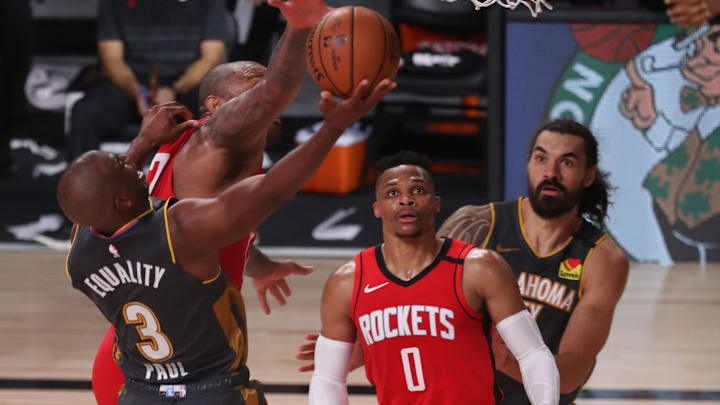The NBA has reached the dead period of the offseason. Sure, there was the brief, recent excitement of the schedule release, but it's back to inactivity until training camp starts around the league.
This means writers have to get creative to generate content, aside from taking a historical dive into the best/worst happenings across the league team-by-team. The Houston Rockets find themselves on these lists quite often, as they are generally one of the more active teams in the Association.
Case in point, Bleacher Report's Andy Bailey's latest article. Bailey crafted a list of the worst NBA trades over the last five years and the Rockets' 2019 trade that sent Chris Paul and four first-round picks to the Oklahoma City Thunder for Russell Westbrook was Bailey's fourth entry.
Bailey stated the following:
"The idea that one or both might be able to sacrifice enough to win a championship seems almost ludicrous in hindsight. Although then-head coach Mike D'Antoni eventually pulled a rabbit out of the hat by basically playing Westbrook as a point center, this Houston team never felt like a threat to the true contenders.
Meanwhile, after helping the Rockets give the Golden State Warriors two of their more challenging series of the Lightyears Ahead era, CP3 had almost twice as many wins over replacement player for the Thunder as Westbrook had for Houston.
When you add the fact that Houston was the team that surrendered multiple first-round picks in this deal, it starts to look nightmarish."
This move being on such a list isn't an issue for me. It's fair.
One of the Houston Rockets’ most recent franchise-altering moves has been featured on a list of the worst NBA trades over the last five years.
But not so much for any of the reasons Bailey listed. For me, it's the fact that the Rockets gave up so much for what essentially became an unplanned one-year rental.
Giving up your future for one season isn't optimal.
As Bailey mentioned, the Rockets had a good deal of success with Westbrook, after making the full-time commitment to small-ball. Westbrook had arguably his best season in Houston, posting averages of 27.2 points, 7.9 rebounds, 7 assists, and 47.2 percent from the field (career-best).
In fact, Westbrook had a strong case for winning Player of the Month in February, averaging 33.4 points, 7.3 rebounds, 6.4 assists, 54.9 percent from the field, 59.4 percent true shooting, and even 40 percent from deep. The Rockets went 7-1 during that month, while Westbrook had 6 30-balls and 2 40-burgers.
All told, the Rockets finished the season with the fourth-best record in the Western Conference and Westbrook made the All-NBA team.
So why not run it back one more year?
Especially considering the fact that Westbrook was rather ineffective in the postseason, due to a combination of a quadriceps injury and contracting COVID during the league's period of suspended play. Many were left wondering how much differently the Rockets' postseason in the bubble would have been were it not for these things.
Again, so why not run it back one more year?
The answer is because James Harden had determined that it was time to blow it up, although this time he would be the one being shipped out.
The Rockets will be feeling the effects of this deal for the next three years, as they surrendered a 2024 first-round pick, a 2025 first-round pick, and a 2026 first-round pick, in addition to a 2021 first-round pick that didn't convey, as it was top-four protected.
For this reason, this deal deserves to be on Bailey's list.
